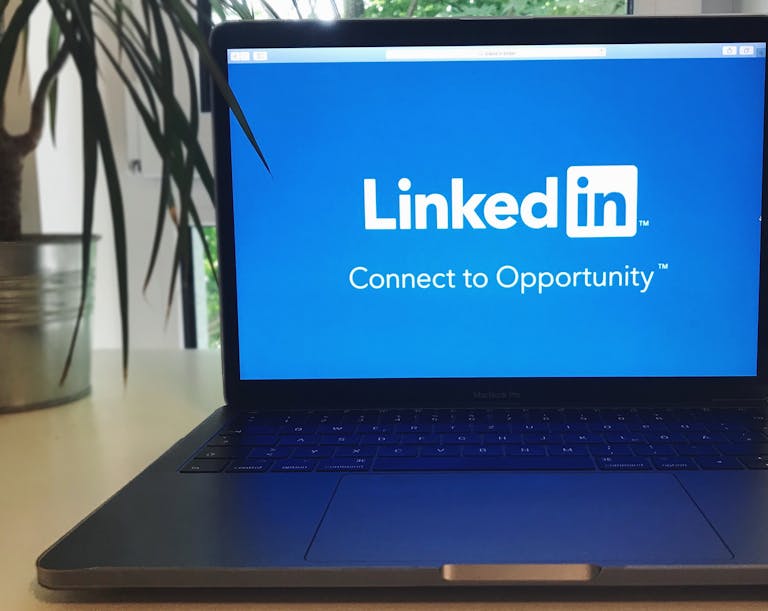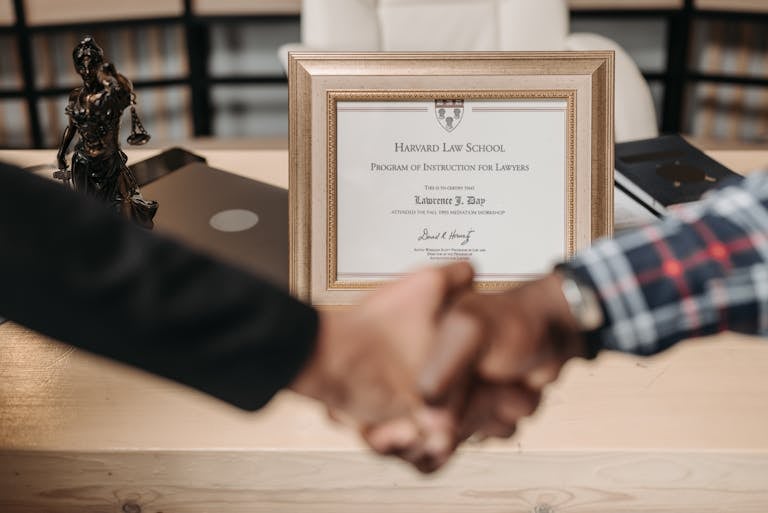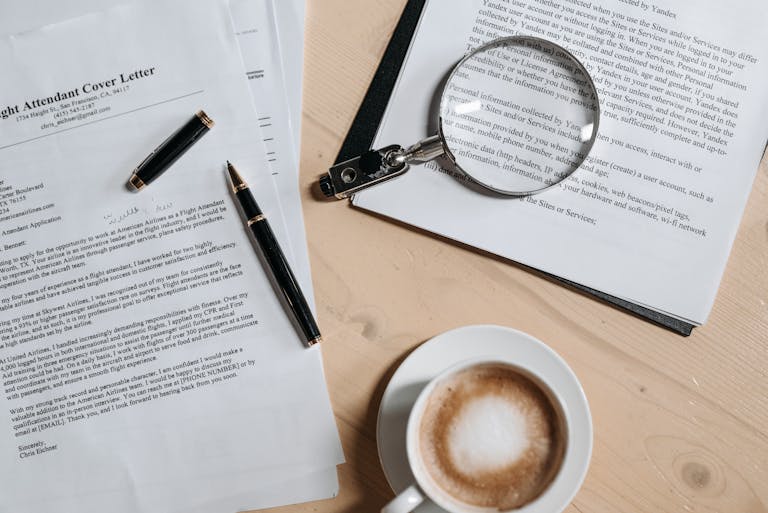Master the ‘Tell Me About Yourself’ Question: Winning Strategies, Formula & Examples
Nail Your First Impression and Land Your Dream Job
Imagine walking into a room, your heart racing with anticipation. It’s the moment before a job interview starts, and you’ve rehearsed every possible question.
Then comes the classic opener, “Tell me about yourself.” Suddenly, it feels like all your preparation is slipping away. This question seems simple, yet it’s here that many stumble, unsure of what to share. How do you strike the perfect balance in your response?
Well, you’re in luck!
This post is your key to unlocking a powerful introduction in any interview setting. We’re breaking down the “Tell Me About Yourself” question into a three-part formula. It will showcase your professional background and highlight your fit for your target role.
Stick with us, and walk into your next interview equipped to make a stellar first impression.
Master a Three-Part Answer Strategy (Tell Me About Yourself Formula) with Proven Examples
When you’re asked, “Tell me about yourself,” what the interviewer is really looking for is a quick way to understand who you are and why you’re sitting in front of them.
They want the Cliff Notes version of your professional journey that’s relevant to the job you’re applying for.
Here’s how you can break it down:
1. Who You Are (Your Professional Headline):
Start with a bang! Kick off with a crisp sentence that encapsulates who you are professionally.
Think of it as your professional title, like ” I’m a data-driven marketing professional with a passion for crafting compelling campaigns that generate results.”
This sets the stage and tells the interviewer immediately what you bring to the table.
2. Your Highlights (Showcase Your Achievements):
This is your chance to shine.
Pick 2-3 achievements that directly connect to the desired skills for the job.
If you led a project that resulted in a 50% increase in website traffic, this is the time to mention it!
Remember, numbers and outcomes grab attention and make your achievements tangible.
3. Why This Role (Connect Your Journey to the Opportunity):
Wrap up by connecting the dots between your journey and the job you’re applying for.
This is where you show that you’re not just looking for any job – you’re interested in this particular role at this particular company. Share what excites you about the opportunity and how you see yourself contributing.
For instance, “I’m thrilled by the prospect of leveraging my expertise in social media marketing at a forward-thinking company like yours, where I can contribute to innovative campaigns that drive brand awareness”
Why It Works:
This formula works because it gives a structured yet personalized overview of your professional background. It focuses on what’s most relevant to the position.
It shows your qualifications. It also shows your enthusiasm and fit for the role. These are key things that hiring managers seek in a candidate.
The three-part formula breaks down into “Who You Are,” “Your Highlights,” and “Why This Role.” Here’s how you can visualize this approach:
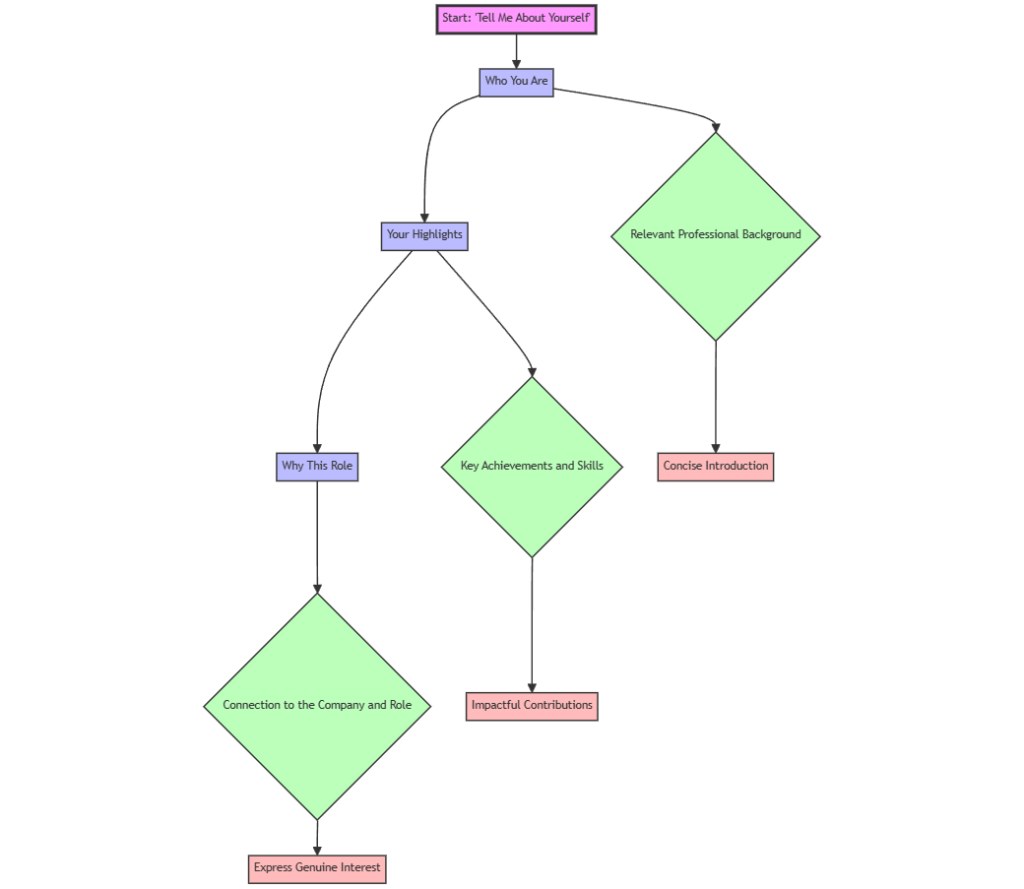
Feeling inspired by the three-part formula but not sure how to tailor it to your unique story?
Wealth Waggle’s Tell Me About Yourself Coach can help. Jean Ross, leveraging insights on making a strong first impression, guides you in crafting concise and memorable self-introductions.
Start your coaching session now and ensure you make an unforgettable impact in your next interview.
How to Transform Your Interview Answers with the Three-Part Formula
When you break down your answer to “Tell Me About Yourself” using the three-part formula, you’re doing more than just talking about yourself. You’re strategically guiding the interviewer through your professional narrative, highlighting key points that are directly relevant to the job you’re aiming for. Here’s why this approach is a winner:
1. Clarity and Focus: By starting with a clear statement about who you are, you immediately provide the interviewer with a framework to understand the rest of your answer.
It’s like giving them the title of the story you’re about to tell. This clarity makes it easier for them to follow along and remember you after the interview.
2. Demonstrated Value: The highlights section is where you prove your worth. By choosing achievements that are relevant and impressive, you’re essentially showcasing your track record of success.
This isn’t just about listing past job duties; it’s about showing how you made a difference. It’s hard evidence that you can bring value to the team.
3. Personal Connection: Ending with why you’re excited about the role makes your answer personal. It shows that you’ve thought about how you fit into the company and why you’re motivated to work there.
This personal touch can make a big difference in an interview, setting you apart from candidates who might seem like they’re just looking for any job.
The Psychology Behind It:
This structured approach taps into several psychological principles that make your answer more compelling.
For example, the recency effect suggests that people remember the last thing they hear more vividly. By ending your answer with your enthusiasm for the role, you leave a lasting impression that you’re genuinely interested in the job.
Moreover, the formula ensures you cover all bases – who you are, what you’ve done, and where you see yourself going. This completeness satisfies the interviewer’s need for information and demonstrates your ability to communicate effectively, a key skill in any job.
Applying What You’ve Learned:
- Tailor Your Introduction: Before your interview, research the company and the role thoroughly. Use what you learn to tailor the “Who You Are” part of your answer, ensuring it aligns with the company’s values and the job requirements. This shows you’re not just a great candidate on paper but also a perfect fit for their specific needs.
- Select Your Highlights Wisely: Choose achievements that not only showcase your skills but also demonstrate your ability to solve problems similar to those the company faces. This strategic selection implies that you’re already thinking about how you can contribute and make a difference.
- Express Genuine Interest: In the “Why This Role” part, go beyond stating what you like about the company. Share how you envision contributing to specific projects or initiatives. This shows you’ve done your homework and are already invested in the company’s success.
Broader Implications:
- Enhanced First Impressions: Using this structured approach helps you come across as organized, confident, and clear about your professional narrative. First impressions are critical in interviews, and a well-articulated introduction sets a positive tone for the rest of the conversation.
- Increased Recall Among Interviewers: By presenting a memorable story that ties directly to the job at hand, you’re more likely to stand out among a sea of candidates. Interviewers are more likely to remember you as the candidate who not only met the job criteria but also showed enthusiasm and a clear vision for how they fit into the organization.
- Preparation Meets Opportunity: Effectively using this formula demonstrates your ability to communicate succinctly—a skill valued in any role. This methodical preparation shows that you’re not just interested in any job, but you’re specifically interested in this job, at this company, which speaks volumes to hiring managers.
From New Grads to Career Changers: Examples Using the Three-Part Answer
Example 1: The Recent Graduate
- Who You Are: “I recently graduated with a degree in Marketing, where I developed a strong foundation in digital marketing strategies and brand management.”
- Your Highlights: “During my final year, I led a project for a local business, implementing a social media campaign that increased their engagement by 40% in just three months.”
- Why This Role: “I’m excited about the opportunity to bring my fresh perspective and digital marketing skills to your team, especially since I admire how your company leverages social media to connect with the community.”
Example 2: The Mid-Career Professional
- Who You Are: “I’m a seasoned software engineer with over ten years of experience in developing scalable web applications, primarily in the fintech sector.”
- Your Highlights: “At my current job, I spearheaded a team that redesigned a core banking platform, improving transaction processing times by 30%. Additionally, I initiated a mentorship program that boosted team productivity and morale.”
- Why This Role: “I’m drawn to your company’s innovative approach to banking technology and am eager to contribute to developing groundbreaking features that enhance user experience.”
Example 3: The Career Changer
- Who You Are: “After a rewarding decade in the hospitality industry, where I honed my skills in customer service and operations management, I’ve pivoted towards project management to make a broader impact within organizations.”
- Your Highlights: “I successfully transitioned by earning a certification in project management and volunteering to lead several community projects, one of which increased local park usage by 25%.”
- Why This Role: “Your company’s commitment to community engagement and sustainability is inspiring. I see a fantastic opportunity to apply my project management skills and passion for service in a new context, driving meaningful projects that align with my values.”
After reading through these examples, here’s a table to summarize the key components of our three-part formula, making it easy to remember and apply:
| Component | Description | Key Tip |
|---|---|---|
| Who You Are | Your professional headline. | Keep it concise and relevant to the role. |
| Your Highlights | A few key achievements. | Use quantifiable results to demonstrate impact. |
| Why This Role | Why you’re excited about this role. | Link your motivation to the company’s mission. |
This table is a compact recap, designed to solidify your understanding and help you prepare your own impactful answer. For more related examples, check out this article: 12 Effective “Tell Me About Yourself” Examples for Professional Success.
Step-by-Step to Interview Excellence: Crafting Your Winning Answer
- Reflect on Your Professional Journey:
Start by jotting down the milestones in your career. Include your education, key jobs, projects, and any volunteer work. Highlight the achievements you’re most proud of. - Identify the Common Thread:
Look for a theme or common thread that ties your experiences together. This could be a specific skill set, a passion for a particular aspect of your work, or a continuous pursuit of innovation. - Research the Company and Role:
Deep dive into the company’s website, social media, and recent news articles to understand its mission, culture, and challenges. Align your findings with the role you’re applying for. - Craft Your “Who You Are” Statement:
Based on your reflection and research, craft a concise statement that encapsulates who you are professionally. Make it relevant to the role and company you’re applying to. - Select Your Highlights:
Choose 2-3 achievements that best represent your skills and successes. Use specific numbers and outcomes to quantify your impact wherever possible. - Express Your Enthusiasm for the Role:
Think about why you’re excited about this opportunity. Is it the company’s innovative approach, its culture, or the potential to work on certain projects? Be specific and genuine. - Practice Your Delivery:
Practice saying your answer out loud until it feels natural but not memorized. Aim for a confident and conversational tone that conveys your enthusiasm and professionalism. - Seek Feedback:
If possible, get feedback on your answer from a trusted friend, mentor, or career coach. Use their insights to refine your response further. - Stay Flexible:
Be prepared to adapt your answer depending on the flow of the interview. While you should have your main points ready, the conversation might lead you to emphasize different aspects of your experience.
FAQs: Expert Answers to Your Top Interview Questions
Q1: How long should my answer to “Tell Me About Yourself” be?
- A: Aim for a response that’s about 1-2 minutes long. It’s enough time to share who you are, your achievements, and why you’re excited about the role without losing the interviewer’s interest.
Q2: Can I include personal information in my answer?
- A: While the focus should be professional, it’s okay to briefly mention personal interests or experiences if they’re relevant to the job or highlight your personality in a way that adds to your professional narrative.
Q3: What if I have little to no work experience?
- A: Focus on your education, any internships, volunteer work, or projects that demonstrate your skills and enthusiasm for the field. Highlight traits like your willingness to learn, problem-solving abilities, and how your interests align with the company’s mission.
Q4: How do I avoid sounding rehearsed?
- A: Practice your answer enough so you’re comfortable but not memorized. Keep a conversational tone, and be ready to adapt your answer to the flow of the interview, which can help it feel more natural.
Q5: Should my answer be the same for every interview?
- A: No, you should tailor your answer to each specific role and company. Researching the company and understanding the job description can help you highlight the most relevant parts of your professional journey.
Q6: How can I stand out with my answer?
- A: Make your answer memorable by sharing a unique accomplishment, demonstrating your passion for the field, and explicitly connecting your background to what the company needs. Showing genuine enthusiasm for the role and company can also make a strong impression.
Q7: What if I get nervous and forget what to say?
- A: It’s okay to take a moment to collect your thoughts. Interviewers understand that interviews can be nerve-wracking. If you forget a part of your answer, gracefully steer back to your main points: who you are, your highlights, and why this role excites you.
Remember, the key to a memorable “Tell Me About Yourself” answer lies in your ability to articulate your professional journey, highlight your achievements, and demonstrate your enthusiasm for the role.
Armed with this guide, you’re ready to make a compelling first impression in your next job interview.
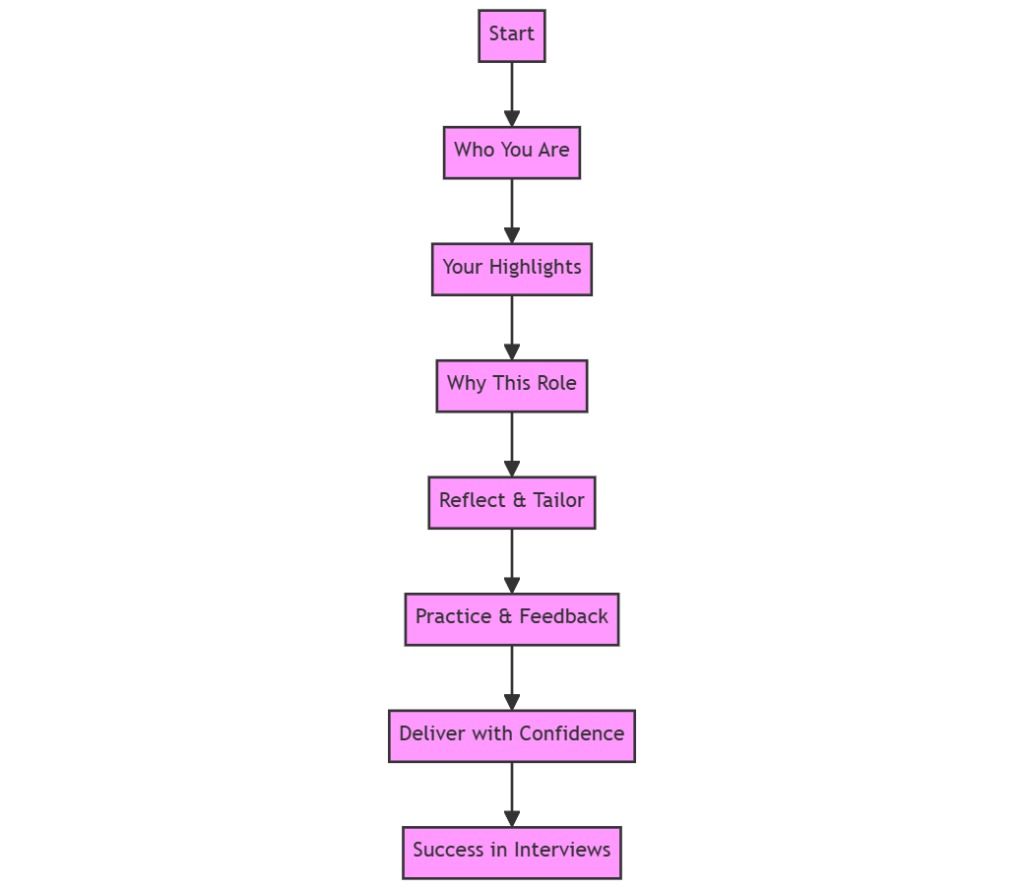
Ready to take your interview prep to the next level? With Wealth Waggle’s Tell Me About Yourself Coach, you’ll develop an introduction that truly stands out. Jean Ross’s expertise in the crucial first 60 seconds of an interview will ensure you start on the right foot. Dive deeper into personalized coaching to highlight your unique background and career goals confidently.
Talk Resumes with Wealth Waggle
Perfect your resume with AI-assisted feedback and tips (using the latest recruiting intelligence).



